Fesdhoo Wreck Dive Site
Explore one of the Maldives' most exciting wreck dives - an intact cargo ship transformed into a thriving artificial reef in Alif Alif Atoll
About Fesdhoo Wreck
The Fesdhoo Wreck is one of the most impressive wreck dives in the Maldives, featuring an intact cargo vessel that was intentionally sunk to create an artificial reef. Located in Alif Alif Atoll, this 50-meter-long ship rests upright on the sandy bottom at 30 meters depth, with its deck at around 18 meters.
What makes Fesdhoo Wreck special is its excellent condition and the rapid marine growth that has transformed it into a thriving ecosystem. The wreck is completely covered in colorful soft corals, sponges, and hydroids, attracting a diverse array of marine life including schools of snappers, groupers, and batfish.
The wreck offers exciting penetration opportunities for certified wreck divers, with the cargo holds, bridge, and engine room all accessible. For those who prefer to stay outside, the exterior provides excellent wide-angle photography opportunities with the intact superstructure creating dramatic silhouettes.
Fesdhoo Wreck Quick Facts
- Location: Alif Alif Atoll (North Ari Atoll)
- Depth Range: 18-30 meters (60-100 feet)
- Visibility: 20-30 meters (65-100 feet)
- Current: Mild to moderate
- Experience Level: Intermediate to Advanced
- Best Time: Year-round
- Wreck Length: 50 meters (164 feet)
- Sunk: 2001 (intentionally as artificial reef)
History of Fesdhoo Wreck
The Fesdhoo Wreck is a former cargo vessel that was intentionally sunk in 2001 to create an artificial reef and dive site in Alif Alif Atoll. The ship was carefully prepared for sinking, with all hazardous materials removed and access points cut to allow safe penetration.
Originally built in the 1970s, the vessel served as a cargo ship in the Indian Ocean before being acquired by a Maldives dive resort for the purpose of creating an artificial reef. The sinking was carefully planned to ensure the ship would land upright on the sandy bottom at an ideal depth for recreational diving.
Over the past two decades, the wreck has become completely encrusted with marine growth, transforming into a thriving ecosystem. The rapid colonization by corals and marine life makes Fesdhoo Wreck an excellent example of successful artificial reef creation in the Maldives.
Wreck Features
Fesdhoo Wreck offers divers multiple areas to explore, both inside and outside the ship's structure.

Superstructure
The ship's bridge, mast, and deck equipment remain intact and are completely covered in soft corals and sponges. These areas are perfect for wide-angle photography.
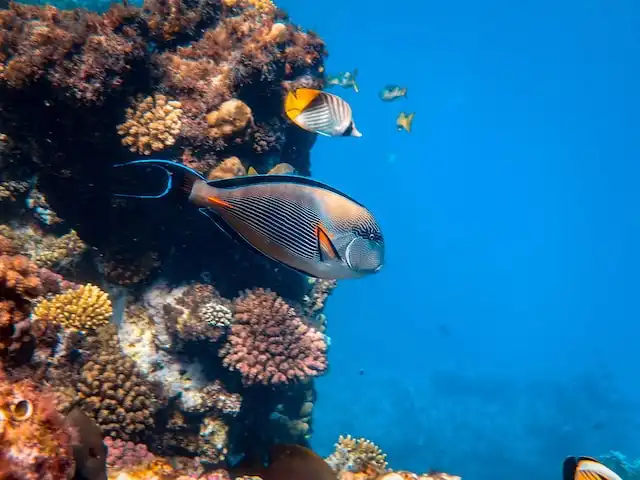
Cargo Holds
Two large cargo holds are accessible to certified wreck divers, with entry points cut during the sinking preparation. The holds often shelter schools of glassfish.

Coral Growth
The entire wreck is covered in colorful soft corals, sponges, and hydroids, creating a stunning underwater landscape teeming with reef fish.

Marine Life
The wreck attracts large schools of snappers, batfish, and groupers, along with occasional sightings of reef sharks and eagle rays.
Typical Dive Profile
Here's what you can expect during a typical dive at Fesdhoo Wreck:
Descent Line
Dives typically begin with a descent along the mooring line to the wreck's superstructure at 18 meters. The line helps maintain orientation and prevents accidental contact with the reef.
Superstructure Exploration
The dive begins at the ship's bridge and deck area, where divers can explore the intact superstructure covered in marine growth. This is the best area for wide-angle photography.
Cargo Hold Penetration
Certified wreck divers can explore the cargo holds through prepared entry points. These large spaces often shelter schools of fish and are illuminated by light streaming through openings.
Exterior Circumnavigation
Divers can swim around the exterior of the wreck, observing the marine life that has colonized the hull and the sandy bottom surrounding the ship.
Safety Stop & Ascent
The dive concludes with a safety stop near the mooring line before ascending to the surface. The nearby reef provides an alternative safety stop location.
Marine Life at Fesdhoo Wreck
The wreck has become home to a diverse array of marine species, making it one of the best artificial reefs in the Maldives.

Grouper
Several species of grouper patrol the wreck, using the structure for shelter and hunting. The most commonly seen are coral groupers and peacock groupers.

Eagle Ray
These graceful rays are often seen gliding over the wreck or along the sandy bottom nearby. They're particularly active during incoming tides.
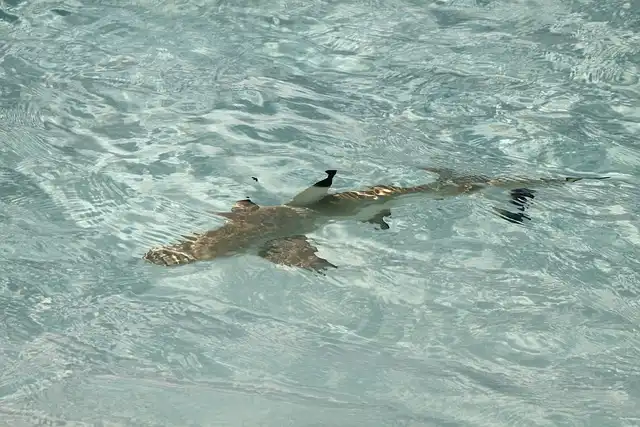
White Tip Reef Shark
These small sharks are often seen resting under the wreck or patrolling the sandy areas nearby. They're generally docile and allow close approach.
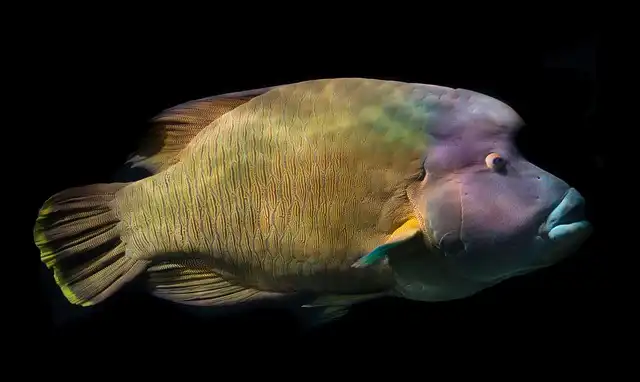
Napoleon Wrasse
These large, curious fish are sometimes seen inspecting divers near the wreck. They're particularly interested in divers with cameras.
Wreck Diving Safety
While Fesdhoo Wreck is considered a relatively safe wreck dive, proper precautions should always be taken when diving on artificial structures.
Certification
Penetration requires Advanced Open Water and Wreck Diver specialty certification. Stay outside the wreck if you're not properly trained.
Navigation
Always maintain contact with the mooring line or wreck structure. Carry a dive light even for daytime dives to illuminate interior spaces.
Buddy System
Never penetrate the wreck alone. Maintain visual contact with your buddy at all times and agree on signals before descending.
Buoyancy Control
Excellent buoyancy is essential to avoid stirring up silt or damaging delicate marine growth on the wreck.
Air Management
Plan to exit the wreck with at least half your air remaining. Deeper sections require careful air monitoring.
Equipment
Use a reel and line for penetration. Avoid dangling equipment that could snag on the wreck structure.
Location and Access
Getting to Fesdhoo Wreck
Fesdhoo Wreck is located in Alif Alif Atoll (North Ari Atoll), approximately 70 kilometers west of Male. The site is accessible by boat from nearby resorts and liveaboard dive vessels.
Access Options:
- Resort Dive Centers: Many resorts in Alif Alif Atoll offer trips to Fesdhoo Wreck
- Liveaboards: Most Maldives liveaboards include Fesdhoo Wreck in their Ari Atoll itineraries
- Day Trips from Male: Some dive operators in Male offer full-day excursions to the wreck
Nearby Resorts
Dive Conditions
- Depth Range: 18-30 meters (60-100 feet)
- Visibility: 20-30 meters (65-100 feet)
- Currents: Mild to moderate
- Water Temperature: 27-30°C (81-86°F)
- Experience Level: Intermediate to Advanced
- Best Time: Year-round
What to Bring:
- Dive light (even for daytime dives)
- Surface Marker Buoy (SMB)
- Dive computer
- Underwater camera with wide-angle lens
- 3mm wetsuit recommended
Other Dive Sites Near Fesdhoo Wreck
While visiting Fesdhoo Wreck, explore these other excellent dive sites in Alif Alif Atoll.
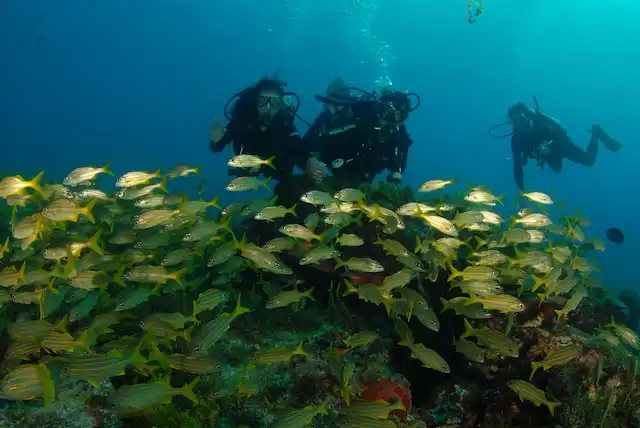
Maaya Thila
A beautiful thila dive with excellent coral formations and abundant marine life including sharks, rays, and turtles. Night dives are particularly spectacular.
Depth: 5-30 meters | Level: All levels

Chaaya Reef
A vibrant coral reef with excellent biodiversity, featuring overhangs, swim-throughs, and a good chance of spotting reef sharks and turtles.
Depth: 10-25 meters | Level: Beginner to Intermediate
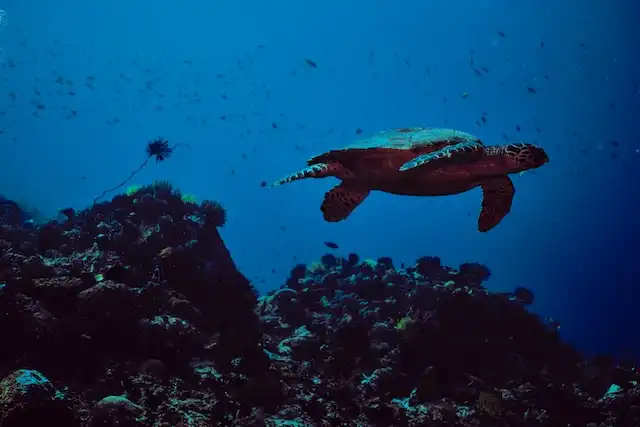
Fish Head
An exciting dive site known for its large fish populations including grey reef sharks, Napoleon wrasse, and big schools of snappers and fusiliers.
Depth: 15-30 meters | Level: Advanced
Best Time to Dive Fesdhoo Wreck
Northeast Monsoon (December - April)
This period offers the best overall conditions for diving Fesdhoo Wreck:
- Excellent visibility (25-30 meters)
- Calm sea conditions
- Mild currents
- Higher chance of seeing pelagic species
- Peak tourist season with frequent dive trips
Southwest Monsoon (May - November)
Diving is possible year-round, with some variations:
- Slightly reduced visibility (15-25 meters)
- More plankton in water (attracts filter feeders)
- Occasional stronger currents
- Fewer crowds and better availability
- Lower prices for accommodations
Frequently Asked Questions
While beginners can dive Fesdhoo Wreck by staying above 18 meters and not penetrating the wreck, the site is best suited for intermediate divers with good buoyancy control. The depth (reaching 30m) makes this a more challenging dive for beginners. Most dive operators require Open Water divers to be accompanied by a guide.
To penetrate Fesdhoo Wreck, you should have at least Advanced Open Water certification and preferably a Wreck Diver specialty certification. Some dive operators may require proof of previous wreck diving experience. Always dive within your training and comfort level when exploring Maldives wreck sites.
Visibility at Fesdhoo Wreck is typically excellent, ranging from 20-30 meters (65-100 feet) during the northeast monsoon (December-April). During the southwest monsoon (May-November), visibility may decrease slightly to 15-25 meters due to plankton in the water, but this often attracts more marine life.
Yes, some operators offer night dives at Fesdhoo Wreck, which can be spectacular as many nocturnal species emerge. However, night dives are typically limited to the shallower sections (above 18m) and exterior of the wreck. Penetration is not allowed during night dives due to safety considerations.
Fesdhoo Wreck is considered one of the best wreck dives in the Maldives due to its intact condition, excellent marine growth, and accessible depth range. Unlike some other wrecks that are broken up or at extreme depths, Fesdhoo offers a complete shipwreck experience for recreational divers. The Victory Wreck is another popular wreck dive, but it's deeper and more broken up.
Ready to Explore Fesdhoo Wreck?
Book your wreck diving adventure in Alif Alif Atoll today and experience one of the Maldives' most impressive artificial reefs.
View Diving Packages